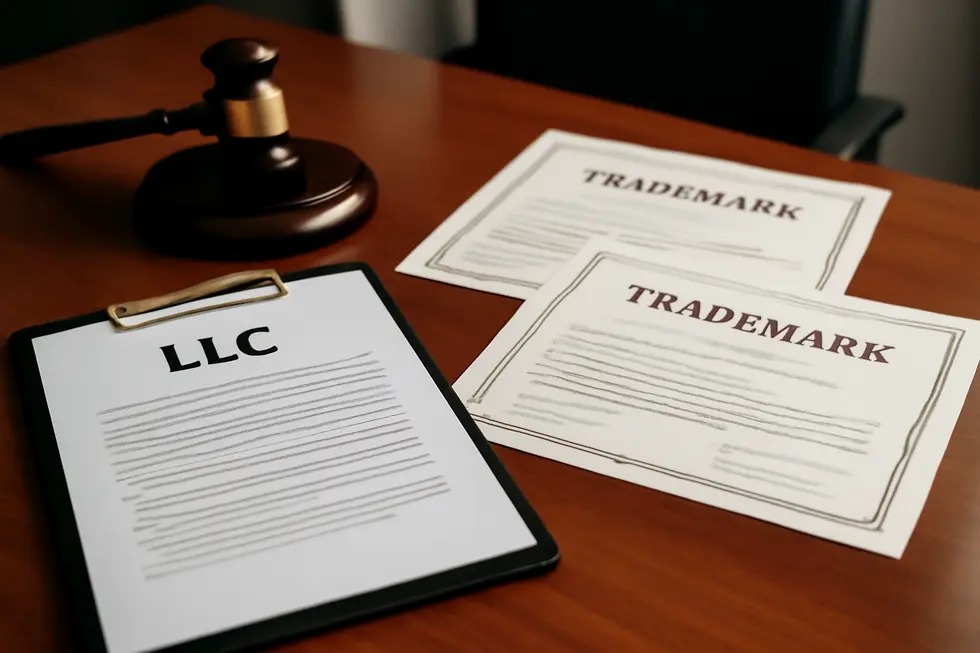Introduction
For business owners, protecting the unique identity of their brand is essential for long-term success. An LLC (Limited Liability Company) is a popular business structure that provides liability protection, but understanding how it intersects with trademark ownership is equally critical. Trademarks represent valuable brand assets, and ensuring that an LLC properly owns and registers these trademarks safeguards both brand identity and business interests. This guide explores the legal and practical considerations of LLC and trademark ownership, walks through the trademark registration process tailored for LLCs, highlights the differences between state and federal trademark protections, clarifies the importance of trademark classes in managing multiple business areas under an LLC, and distinguishes the formation of an LLC from trademark registration to clarify their unique roles. Each chapter is designed to help business owners build a strong foundation for protecting their intellectual property and maximizing the value of their brand assets.
Tables of Contents
Chapter 1: LLC and Trademark Ownership: Legal and Practical Considerations
- Navigating the Legal Structure of LLC Trademark Ownership for Clear Asset Protection
- Navigating Trademark Registration and Assignment for LLCs: Ensuring Clear Ownership and Control
- Safeguarding Intellectual Property: How LLCs Secure and Manage Trademark Assets Effectively
- Strategic Brand Management and Legal Responsibilities When an LLC Owns a Trademark
Chapter 2: Trademark Registration Process for LLCs: Ensuring Proper Ownership
- Establishing and Securing Your LLC’s Business Name for Trademark Ownership
- Securing Clear Trademark Ownership Through LLC-Filed Applications and Assignments
- Navigating Legal Challenges and Sustaining Trademark Validity for LLC Ownership
- Why Registering a Trademark Under Your LLC Maximizes Legal and Business Strength
Chapter 3: Trademark Protection for LLCs: State vs Federal Rights and Benefits
- Navigating Geographic and Legal Boundaries: How LLCs Maximize Trademark Protection from State to Federal Levels
- Balancing Enforcement Strength and Scope: Legal Advantages of State and Federal Trademark Rights for LLCs
- Navigating Costs, Processing Times, and Strategic Choices in LLC Trademark Protection
- Navigating Growth and Legal Strength: Choosing Between State and Federal Trademark Protection for LLCs
Chapter 4: Trademark Classes and LLCs: Managing Multiple Business Areas
- Strategic Trademark Class Registration for LLCs Operating Across Diverse Markets
- Strategic Use of LLCs, DBAs, and Trademark Classes to Protect Diverse Brands
- Strategic Trademark Class Selection and LLC Multistate Compliance for Expanding Enterprises
- Expanding Your LLC’s Brand: Navigating Trademark Classes for Diverse Business Ventures
Chapter 5: Distinguishing LLC Formation from Trademark Registration: Legal Implications
- Understanding the Legal and Structural Distinctions Between LLC Formation and Trademark Registration
- Clarifying Legal Roles: How LLC Formation Differs From Trademark Registration in Protecting Business Identity
- Balancing Liability Protection and Brand Security: Legal Roles of LLC Formation Versus Trademark Registration
- Navigating the Distinct Regulatory Terrain of LLC Formation Versus Trademark Registration
Chapter 1: LLC and Trademark Ownership: Legal and Practical Considerations

1. Navigating the Legal Structure of LLC Trademark Ownership for Clear Asset Protection
An LLC is a distinct legal entity whose formation involves filing state-mandated documents and adhering to naming conventions, often requiring the use of “LLC” or “Limited Liability Company” designators. This legal identity separates the company’s obligations from its members’ personal liabilities. Within this framework, trademarks owned by the LLC become valuable intellectual property assets. Assigning trademark ownership directly to the LLC, rather than to individual members, centralizes control and safeguards personal assets from risks tied to the business, such as infringement disputes. The LLC’s operating agreement plays a crucial role by defining member ownership, management responsibilities, and governance protocols that help avoid internal conflicts. Although the inclusion of “LLC” in marketing trademarks is not compulsory, precise registration under the LLC’s name ensures compliance with state laws and reinforces liability protections. This integration of formation requirements, ownership clarity, and IP management forms the backbone for protecting a brand’s identity and reinforcing the LLC’s legal and practical standing. For guidance on trademark protections relevant to LLCs, exploring detailed resources on trademark protection for business names and logos can be invaluable.
2. Navigating Trademark Registration and Assignment for LLCs: Ensuring Clear Ownership and Control
Trademark registration is a vital process for LLCs to secure exclusive rights to their brand identities, distinct from the company’s legal name. The LLC itself should be the registered owner of the trademark to clearly establish legal control and avoid disputes. Prior to registration, a thorough search must be conducted to confirm the mark’s availability and prevent infringement. Proper registration with the United States Patent and Trademark Office formalizes ownership, strengthening enforcement capabilities against unauthorized use. When transferring or assigning a trademark, LLCs must document the transaction in writing and update official records, ensuring the asset remains protected. Maintaining detailed records of ownership and assignments is crucial for preserving the trademark’s value and facilitating future transactions such as sales or mergers. Besides registration, confidentiality agreements play a key role in safeguarding trade secrets and competitive advantage within the LLC. This careful stewardship of trademarks, aligned with business structuring, empowers LLC owners to protect and leverage their brand effectively over time. For detailed guidance, see the comprehensive insights on company trademarks and logos.
3. Safeguarding Intellectual Property: How LLCs Secure and Manage Trademark Assets Effectively
Holding trademarks within an LLC confers crucial legal and practical benefits by clearly separating intellectual property assets from personal ownership. This separation shields members’ personal assets from potential litigation or creditor claims tied to the trademark, reinforcing robust asset protection. Centralized ownership under the LLC simplifies management, allowing streamlined control over licensing, royalty tracking, and enforcement actions. Such centralized control reduces internal disputes and promotes consistent, strategic decisions on IP use and protection. Moreover, ensuring the LLC itself is the trademark owner clarifies authority in dealings with registries and supports seamless registration and defense of rights. When licensing trademark rights, carefully drafted agreements within the LLC context help unlock value while addressing usage scope, royalties, and improvement ownership. Partnering with experienced IP counsel ensures tailored strategies that align with business objectives and mitigate risks, strengthening the LLC’s trademark portfolio. Overall, keeping trademark assets within the LLC combines limited liability protection with efficient management and strategic flexibility critical for safeguarding brand identities. For more on protecting brand assets, see our detailed guide on trademark protection for business names and logos.
4. Strategic Brand Management and Legal Responsibilities When an LLC Owns a Trademark
When an LLC owns a trademark, it centralizes both legal responsibility and brand management within a distinct business entity, offering key operational and legal advantages. This arrangement protects the personal assets of LLC members by isolating trademark-related liabilities within the company. Holding trademark rights under an LLC also streamlines tasks such as licensing, royalty collection, and enforcement, creating operational efficiency and clarity in financial tracking.
Trademark registration, especially at the federal level, grants the LLC exclusive rights to use, defend, and monetize the brand identity nationwide, which elevates brand value and deters infringement. However, ownership comes with ongoing duties to actively maintain the trademark through proper use, timely filings, and vigilant enforcement, which the LLC’s management must oversee to preserve these protections.
To optimize brand consistency, the LLC should strategically align its registered business name with its trademark, preventing market confusion. Legal compliance with trademark regulations and thorough management of intellectual property assets ultimately fortify the LLC’s competitive position and ensure lasting protection of its brand identity.
For a comprehensive guide on trademark protection for business names and logos, consider exploring resources on trademark protection for business names and logos.
Chapter 2: Trademark Registration Process for LLCs: Ensuring Proper Ownership

1. Establishing and Securing Your LLC’s Business Name for Trademark Ownership
Selecting a business name for trademark registration under an LLC requires careful verification to ensure exclusive ownership. Begin by searching your state’s business entity database to confirm the desired LLC name is available and unclaimed. Once confirmed, register this name with your state’s Secretary of State to secure legal recognition and prevent local duplication. Concurrently, conduct a federal trademark search using the USPTO database to identify potential conflicts with existing trademarks nationwide. This step is essential to avoid infringement and rejection during trademark application.
After confirming both state and federal availability, file your trademark application listing your LLC as the owner. Be diligent in selecting the appropriate trademark class(es) that correspond to your goods or services, as incorrect classifications can delay or weaken protections. Additionally, consider registering a DBA (doing business as) if you intend to operate under a different name, granting marketing flexibility while preserving LLC ownership.
Complement these steps by securing matching domain names and social media handles to protect your brand’s online identity. This multi-layered approach ensures your LLC holds clear, enforceable rights to its business name, strengthening trademark ownership and safeguarding your brand assets. For more details on how trademark protection works for business identity, see this resource on trademark protection for business names and logos.
2. Securing Clear Trademark Ownership Through LLC-Filed Applications and Assignments
To firmly establish trademark ownership within an LLC, the application must identify the LLC as the legal owner from the outset. Filing under the LLC’s name—not an individual’s—aligns ownership with the business entity, protecting the trademark as a core asset. If a mark was initially registered personal to an individual, ownership can be transferred to the LLC through a formal trademark assignment. This transfer requires executing a written agreement and submitting the appropriate documentation, like the USPTO’s Form TM-P, along with fees and notarization. Ensuring proper ownership benefits the LLC not only by consolidating brand rights but also by simplifying licensing or sale, reducing disputes, and aligning intellectual property with the company structure, which is vital for tax and legal clarity. However, ownership alone doesn’t secure rights; the LLC must actively use the trademark in commerce to maintain priority and enforceability. Federal registration enhances protection across all states, offering broader legal security compared to limited state registrations. Prior to filing, conducting a comprehensive trademark search helps avoid conflicts with existing marks, streamlining the registration process. For further insights, reviewing comprehensive guides on trademark protection for business names and logos can be invaluable.
3. Navigating Legal Challenges and Sustaining Trademark Validity for LLC Ownership
In the trademark registration process for LLCs, actively managing legal challenges and upkeep is vital to secure trademark ownership. When facing oppositions, an LLC must respond promptly with compelling evidence like sales and advertising proofs to defend its trademark rights. Resolving disputes amicably through negotiation can avoid costly litigation. Equally important is maintaining the trademark registration through timely renewals, often required every ten years, to prevent cancellation. Any transfer of trademark ownership demands formal assignment documentation and proper filing with the trademark office, ensuring the LLC remains the rightful owner. Accuracy in these records safeguards against disputes and preserves brand assets. Additionally, LLCs should monitor for infringement and take immediate actions, such as cease-and-desist notices, to protect their marks. Providing precise LLC credentials during registration and selecting relevant trademark classes further strengthens protection. Careful attention to these ongoing responsibilities ensures the trademark continues to serve as a valuable and enforceable asset for the LLC. For more on protecting business names and logos, investigating trademark protection strategies can be beneficial.
4. Why Registering a Trademark Under Your LLC Maximizes Legal and Business Strength
Establishing proper trademark ownership under an LLC is vital to safeguard legal rights and reinforce business integrity. When the LLC itself is listed as the trademark owner, the mark becomes a protected business asset, providing exclusive usage rights and solid priority in commerce. This clarity minimizes disputes that often arise if ownership is unclear or assigned to individuals rather than the entity. From a business perspective, having trademarks registered in the LLC’s name enhances credibility, crucial for attracting investors or engaging in mergers and acquisitions. It streamlines due diligence by confirming intellectual property belongs to the company, thus increasing transactional value. Additionally, owning the trademark in the LLC name empowers the company to vigorously enforce its rights, deterring infringement and preserving brand reputation. Proper registration also ensures compliance with legal standards, aligning the trademark with the LLC’s broader business framework. Conducting comprehensive searches prior to application and maintaining active trademark use are essential steps. For a deeper understanding of how trademark priority and ownership secure your LLC’s value, explore insights on trademark protection and asset management at trademark2go.com.
Chapter 3: Trademark Protection for LLCs: State vs Federal Rights and Benefits

1. Navigating Geographic and Legal Boundaries: How LLCs Maximize Trademark Protection from State to Federal Levels
The geographic and legal scope of trademark protection plays a pivotal role in safeguarding an LLC’s brand identity. At the most basic level, common law rights protect a trademark only within the area where the LLC actively uses it, limiting enforceability to that local region. For example, an LLC operating under a specific mark in one city gains rights uniquely tied to that locale. To expand protection, state registration secures the mark across the entire state, offering broader legal safeguards while remaining cost-effective for locally focused businesses. However, only federal trademark registration with the U.S. Patent and Trademark Office grants nationwide rights, essential for LLCs with ambitions beyond their home states. Federal registration conveys exclusive use throughout the country and provides legal tools such as constructive notice and access to federal courts for infringement suits. Moreover, it lays groundwork for international protection via treaties, supporting global business growth. This layered approach ensures an LLC’s trademark remains a valuable asset, legally shielded across multiple jurisdictions and designed to support the company’s evolving footprint. For deeper insights on the foundation of trademark rights, exploring common law trademark protections offers valuable context.
2. Balancing Enforcement Strength and Scope: Legal Advantages of State and Federal Trademark Rights for LLCs
Trademark enforcement mechanisms for LLCs differ significantly between state and federal levels, each offering distinct legal advantages tailored to business needs. Federal registration with the United States Patent and Trademark Office grants LLCs nationwide protection and exclusive rights regardless of use location. This status allows LLCs to file infringement suits in federal courts, seek remedies like injunctions and damages, and display the ® symbol—strengthening deterrence and legal standing. Federal laws, such as the Lanham Act, facilitate more effective actions against counterfeiters and infringers, although compliance with stringent USPTO procedures is necessary.
Conversely, state trademark rights hinge on actual use within the state and typically involve simpler, less costly registration. These rights provide legal protection limited to state boundaries and require enforcement through state courts, where remedies and reach are narrower. For LLCs operating regionally, state rights may suffice, but risks exist if conflicts arise with federally registered trademarks.
Choosing the right route affects an LLC’s ability to protect its brand widely and efficiently. While LLCs benefit from limited liability in disputes, securing federal trademark registration offers superior enforcement capabilities essential for broader market presence. For guidance on trademark enforcement strategies, exploring detailed resources on trademark protection is advisable, such as this useful information on trademark protection for business names and logos.
3. Navigating Costs, Processing Times, and Strategic Choices in LLC Trademark Protection
Trademark protection for an LLC involves balancing cost, processing time, and strategic business goals. State trademark registration offers a cost-effective option, typically with lower fees and quicker processing, granting rights limited to that specific state. This suits LLCs operating locally or testing a brand before expanding. In contrast, federal registration demands higher initial fees—starting around $250 to $350 per class—but delivers nationwide protection and stronger enforcement rights, crucial for LLCs planning multi-state or national growth. Application processing with the USPTO can take six to twelve months, requiring patience and careful preparation, including comprehensive trademark searches and precise class selection to avoid conflicts and maximize coverage. Opting for federal registration also enhances brand credibility and provides legal advantages in disputes, making it an investment aligned with long-term business expansion. LLCs should carefully evaluate their present market scope and future ambitions when choosing between state and federal protections. For a deeper understanding of these strategic decisions, exploring resources on trademark protection for business names and logos is recommended.
4. Navigating Growth and Legal Strength: Choosing Between State and Federal Trademark Protection for LLCs
Trademark protection for LLCs holds significant practical implications tied directly to business growth and legal security. Opting for state registration can be a strategic choice for LLCs focused on local markets. It offers a cost-effective, streamlined process with faster approvals and lower fees, but limits protection to the registering state’s boundaries. This geographic constraint can leave the brand vulnerable as the business expands beyond state lines. In contrast, federal trademark registration provides wider-reaching protection essential for LLCs aiming to grow nationally. Federal registration ensures the LLC can enforce its rights across all states, grant licensing or franchising opportunities, and robustly defend against infringement in federal courts. It also enhances credibility with investors and customers by publicly documenting ownership and exclusive rights. Business owners should carefully evaluate their current market reach and future plans when deciding between these levels of protection. Conducting thorough trademark searches and selecting appropriate classes are vital preparatory steps. Maintaining trademarks through renewals and vigilance against infringement sustains the LLC’s brand value long-term. For further detailed guidance on protecting brand identity within an LLC framework, exploring trademark basics on trademark name and logo protection is highly recommended.
Chapter 4: Trademark Classes and LLCs: Managing Multiple Business Areas

1. Strategic Trademark Class Registration for LLCs Operating Across Diverse Markets
An LLC operating in multiple business areas must carefully register trademarks in all relevant classes to safeguard its brand comprehensively. Trademark law divides goods and services into 45 distinct classes—34 for goods and 11 for services—each requiring separate registration. For example, a business producing both fabrics and apparel should secure trademark protection under Class 24 for fabrics and Class 25 for clothing, ensuring that competitors cannot exploit unregistered categories. While the LLC structure shields the owners’ personal assets and defines the legal entity, it does not extend to brand protection itself. Obtaining trademark registrations in all applicable classes complements the LLC by legally protecting the brand identity in each market segment it serves. This layered approach maximizes brand security by aligning the LLC’s asset protection with strategic trademark filings. Additionally, using DBAs can support varied marketing identities within the LLC without compromising legal clarity. For a deeper understanding of trademark classes and effective multi-class filings, resources such as trademark2go.com provide detailed guidance tailored for business owners.
2. Strategic Use of LLCs, DBAs, and Trademark Classes to Protect Diverse Brands
Effectively managing multiple business areas requires balancing legal protection with operational flexibility. An LLC provides a formal legal structure that shields owners from personal liability while securing exclusive rights to the business name within a state. However, the LLC name alone does not guarantee trademark protection nationally or across industries. To extend brand security, trademarks must be registered in appropriate classes that correspond to the goods or services offered. Each trademark class protects a distinct category, such as retail services or manufacturing, ensuring comprehensive coverage of diverse business activities. Additionally, DBAs (Doing Business As) serve as flexible trade names under the LLC umbrella, enabling businesses to market different lines without forming separate entities. While DBAs facilitate branding and customer recognition, they do not provide legal exclusivity or protection, making trademark registration essential for safeguarding brand assets. By combining an LLC structure with DBAs and securing trademarks across relevant classes, business owners can protect personal assets, maintain marketing agility, and assert strong intellectual property rights. This layered strategy fortifies brand value and legal control while supporting diverse ventures under one corporate identity. For deeper understanding of trademark class specifics, see trademark protection business name logo.
3. Strategic Trademark Class Selection and LLC Multistate Compliance for Expanding Enterprises
Navigating trademark classes thoughtfully is crucial for LLCs operating across diverse product or service lines. Trademarks are categorized into 45 classes, split between goods and services, enabling precise protection tailored to the LLC’s range of activities. Registering in multiple classes shields the brand against infringement in each business sector, supporting expansive growth and market presence.
Simultaneously, LLCs expanding beyond a single state must address various licensing and registration requirements in every jurisdiction where they conduct business. States may require business registration if the LLC engages in local sales, offers services, or directs online transactions to in-state customers. Compliance with these rules, including filing annual reports and paying required fees, preserves the LLC’s good standing and prevents penalties.
Balancing trademark registration across appropriate classes with vigilant observance of state and federal regulations fortifies both brand identity and legal entity status. This integrated approach ensures the LLC retains comprehensive intellectual property protection and operates lawfully in all active markets. For further guidance on securing trademark rights, exploring resources on trademark protection for business names and logos can be invaluable.
4. Expanding Your LLC’s Brand: Navigating Trademark Classes for Diverse Business Ventures
When expanding an LLC into multiple business areas, registering trademarks across relevant classes safeguards your brand comprehensively. The international trademark system divides goods and services into 45 classes—34 for products and 11 for services—each representing distinct market sectors. For LLCs operating in varied fields, securing trademark registrations in each applicable class prevents conflicts and protects your brand identity from dilution or infringement. For instance, an LLC offering software solutions and related consulting services should register trademarks in the classes covering both technology products and business services. Additionally, LLCs can leverage DBAs under a single legal entity to operate multiple brands tailored to different markets efficiently. This strategy provides legal protection while enhancing marketing flexibility, enabling smooth geographic or professional expansion without forming new entities. Navigating trademark classifications and fees requires careful planning: failing to register in all necessary classes may limit your exclusive rights or invite challenges to your trademark. For detailed guidance on trademark protection tailored to business names and logos, consulting specialized resources like this trademark protection guide can be invaluable.
Chapter 5: Distinguishing LLC Formation from Trademark Registration: Legal Implications

1. Understanding the Legal and Structural Distinctions Between LLC Formation and Trademark Registration
Forming an LLC establishes a distinct legal entity that separates owners’ personal assets from the business’s liabilities. This process involves registering a unique business name with state authorities, which must include a designator like “LLC” and adhere to state-specific naming rules. The primary purpose of LLC formation is to create a recognized business framework, ensuring liability protection and compliance with tax and contractual obligations. In contrast, trademark registration protects brand identity elements such as names, logos, or slogans used in commerce. Unlike LLC formation, trademarks can differ from the company’s legal name and focus solely on preventing consumer confusion and unauthorized use. Trademark registration is voluntary but essential for securing exclusive rights at state or federal levels, offering protection that extends beyond the state where the LLC is formed. While LLC formation safeguards the business structure and limits personal risk, trademark registration preserves the brand’s market identity and legal enforceability. Together, these processes fulfill separate yet complementary legal functions crucial for a business’s comprehensive protection. For more on trademark protections for brand names and logos, visit Trademark Protection for Business Name & Logo.
2. Clarifying Legal Roles: How LLC Formation Differs From Trademark Registration in Protecting Business Identity
LLC formation and trademark registration serve fundamentally different legal purposes essential to business strategy. Forming an LLC creates a separate legal entity, offering liability protection and defining taxation and regulatory compliance under state law. The LLC’s name must be unique within its jurisdiction and include an LLC designator, but this name primarily serves legal and contractual identification rather than brand marketing.
In contrast, trademark registration secures exclusive nationwide rights to distinctive brand elements—names, logos, slogans—that distinguish goods or services in the marketplace. This protection prevents competitors from using confusingly similar marks and upholds consumer trust by preserving brand integrity. Importantly, trademark rights extend beyond state boundaries and rely on use and renewal, not mere entity formation.
Because forming an LLC does not protect brand identity, securing a trademark is critical to safe-guarding commercial recognition and preventing infringement. Businesses typically establish their LLC first to define legal structure, then pursue trademarks to protect their branding under commerce law. These distinct but complementary processes reflect the dual priorities of legal business organization and market identity protection.
For more on brand protection strategies, see the detailed discussion at trademark protection business name logo.
3. Balancing Liability Protection and Brand Security: Legal Roles of LLC Formation Versus Trademark Registration
An LLC provides crucial limited liability protection by creating a distinct legal entity that shields owners’ personal assets from business debts and legal claims. This legal separation establishes clear boundaries between the business entity and its members, influencing operational aspects such as taxation, governance, and credibility with stakeholders. In contrast, trademark registration specifically safeguards a company’s brand identity—its name, logo, or slogan—by granting exclusive rights to use those marks commercially. However, registering a trademark does not confer liability protection nor affect the company’s legal structure; the owner remains personally responsible for business liabilities. While LLC formation focuses on risk management and formalizing business operations, trademark registration serves to protect intellectual property and secure market exclusivity. Together, these legal tools address different but complementary needs: the LLC limits financial exposure and structures the business, whereas trademarks ensure brand recognition and guard against infringement. Understanding their distinct legal implications helps businesses strategically establish both a resilient legal foundation and a protected brand presence. For more on trademark protections valuable to LLCs, see this resource on trademark protection for business names and logos.
4. Navigating the Distinct Regulatory Terrain of LLC Formation Versus Trademark Registration
LLC formation and trademark registration are separate legal processes governed by different regulatory frameworks and compliance mandates. Establishing an LLC involves filing Articles of Organization with the state, providing essential information such as the LLC’s name—typically requiring designators like “LLC”—a registered agent, and the principal address. This procedure creates a formal legal entity insulated from personal liability and subject to ongoing state regulations, including tax filing and licensing requirements. In contrast, trademark registration safeguards distinct brand identifiers like logos, names, or slogans at the federal or state level. This process focuses solely on intellectual property protection and does not create or impact the business entity itself. Trademark applicants submit applications to the USPTO or state trademark offices, demonstrating use or intent to use the mark in commerce, and must comply with distinct standards to ensure the mark’s eligibility and non-infringement of existing rights. The legal implications diverge: LLC formation separates owners’ personal liability from business debts, while trademark registration grants exclusive commercial use rights without affecting liability. These differences emphasize the importance of carefully navigating state business regulations alongside intellectual property laws. For further guidance on trademark protections, see trademark protection for business name and logo.
Final thoughts
Understanding the intersection between LLCs and trademarks is essential for business owners aiming to protect their brand identity and secure valuable intellectual property assets. Properly assigning trademark ownership to the LLC ensures clarity and legal protection, while navigating the registration process with precision establishes firm control over trademark rights. Differentiating between state and federal protections allows businesses to maximize coverage suitable for their operations. Managing trademark classifications enables LLCs with multiple business areas to safeguard every unique aspect under their umbrella. Finally, recognizing the distinct legal roles of LLC formation and trademark registration helps maintain compliance and strategic asset protection. With these insights, business owners can confidently protect their brand and position their company for sustainable growth and success.
Your IP is the foundation of your success – let’s protect it together before it’s too late. We can’t wait to help you turn your ideas into legally secured assets.
About us
undefined


